When it comes to construction or excavation projects, choosing the right equipment can significantly impact the efficiency and success of your work. The decision between an excavator and backhoe is one you’ll need to make based on your project’s size, complexity and specific requirements. If you’re handling heavy-duty, large-scale tasks, you might opt for an excavator. However, if your project is smaller or requires versatility and flexibility in confined spaces, a backhoe could be the better choice. This article will guide you through the factors that differentiate these two machines, helping you decide which one is the best fit for your needs.
Choosing between an excavator and backhoe depends on the nature of your project. Excavators are best for heavy-duty tasks like deep trenching and large-scale digging. On the other hand, backhoes offer greater versatility and maneuverability for smaller, more flexible jobs in confined spaces.
Now let’s dive deeper into the key differences between excavator and backhoe and explore how to choose between backhoe and excavator to find the best option for your work.
What is Excavator and Backhoe?
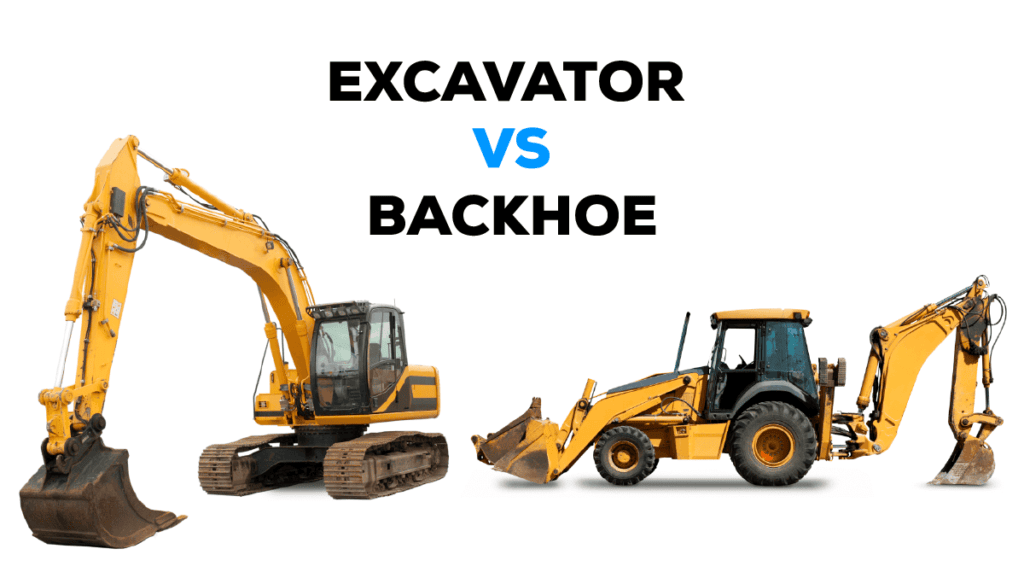
Before deciding between an excavator and backhoe, it’s essential to understand what each machine does and how it’s designed to perform different tasks. While both are excavation machines, their configurations, functions and capabilities vary, making them suitable for distinct types of projects.
Excavators are heavy-duty machines with a long arm and bucket, designed for digging deep and large-scale earth-moving. Backhoes, on the other hand, are smaller, versatile machines equipped with a bucket on the front for loading and a backhoe arm at the rear for digging, making them perfect for smaller tasks and confined spaces.
Excavators are used primarily for large-scale projects where deep, heavy digging is required, such as road construction, mining or foundation work. Their long arm and large bucket make them ideal for such tasks. Meanwhile, backhoes offer more flexibility and can be used for a variety of tasks, including digging, loading and trenching, making them better suited for smaller, residential or utility projects. Understanding their designs will help you determine which is more appropriate for your job.
Excavator VS Backhoe-What Are Advantages and Disadvantages of Excavators
Excavators are typically considered the go-to machines for large-scale excavation due to their power and depth. They are designed to handle the toughest jobs, from deep trenching to heavy earth-moving. But while they excel in many areas, they do have their limitations.

Advantages: Excavators can perform heavy-duty tasks with ease, from deep digging to material handling. Their large size and strong hydraulic systems allow them to work on tough terrains and in extreme conditions.
Disadvantages: Excavators are large, making them less maneuverable. They require a lot of space to operate efficiently and their high fuel consumption can make them expensive to run.
You’ll find excavators indispensable for large excavation projects. Whether you’re digging a deep trench, handling large materials or clearing debris, excavators are built to handle the job with ease. However, they can be less ideal for small or confined spaces, where their size and weight become a disadvantage. Additionally, their operational costs, including fuel and maintenance, tend to be higher than other equipment.
Moreover, excavators are typically better for projects that involve soil removal or material transport. Their size, power and precision make them capable of handling tough tasks such as removing debris after a demolition, digging deep foundations or even participating in mining projects. For large-scale construction and infrastructure projects, they offer unrivaled performance and efficiency.
However, their high upfront costs and ongoing maintenance expenses can make them less feasible for smaller, budget-conscious projects. Excavators are better suited for tasks that justify their significant cost and fuel consumption, so assessing the specific needs of your project is essential.
Excavator VS Backhoe-What Are Advantages and Disadvantages of Backhoe

Backhoes might not match the power or depth of excavators, but their versatility makes them an excellent choice for a variety of tasks. From digging to loading and even light lifting, backhoes can perform many functions, often in smaller, more confined areas.
Advantages: Backhoes are highly versatile, ideal for tasks like trenching, digging and loading. Their compact design allows for easy maneuverability in confined spaces and they are typically more fuel-efficient and affordable than excavators.
Disadvantages: While backhoes are versatile, they lack the power and digging depth of excavators. They are better suited for smaller-scale tasks and can struggle with heavy-duty jobs.
If you’re working on a smaller project or need a machine that can perform multiple tasks, a backhoe is likely the better choice. They excel in residential construction, landscaping or utility installation. Their smaller size allows them to navigate tight spaces, making them ideal for urban or suburban environments.
On the downside, backhoes are not as powerful as excavators and struggle with larger, deep digging projects. If you need to perform tasks such as deep trenching or digging foundations for large buildings, a backhoe will fall short. They also lack the long reach and power needed for material handling or demolition in large-scale construction sites. While they are cheaper to operate and purchase, the compromise in power and depth limits their application for heavy-duty projects.
For many small-to-medium projects, a backhoe provides an all-in-one solution, often with a bucket on the front and a backhoe arm on the rear, allowing you to perform a variety of tasks without the need for multiple machines.
Excavator VS Backhoe- When Should You Choose an Excavator?

If your project involves large-scale excavation or heavy lifting, an excavator is likely your best choice. Excavators are designed to handle the toughest digging tasks and their power and reach make them ideal for projects that require deep digging and material handling.
Excavators excel in large construction projects, where deep trenching, material handling or demolition is required. They are the go-to machines for projects that involve heavy-duty earth-moving and complex excavation work.
If your project involves digging foundations for buildings, trenching for underground utilities or preparing large excavation areas for infrastructure projects, an excavator will provide the necessary power and performance. They can handle challenging tasks such as digging deep trenches, breaking through rock and clearing large debris quickly and efficiently.
The size of the machine and its hydraulic strength give excavators the advantage in these demanding environments. While they require a significant upfront investment and ongoing maintenance, their performance in demanding tasks justifies the costs.
For projects like road construction, mining or large-scale demolition, excavators are often the machine of choice due to their powerful arms, ability to lift heavy loads and deep digging capabilities. Their versatility in harsh environments makes them an invaluable asset in large projects where reliability and power are paramount.
Excavator VS Backhoe-When Should You Choose a Backhoe?
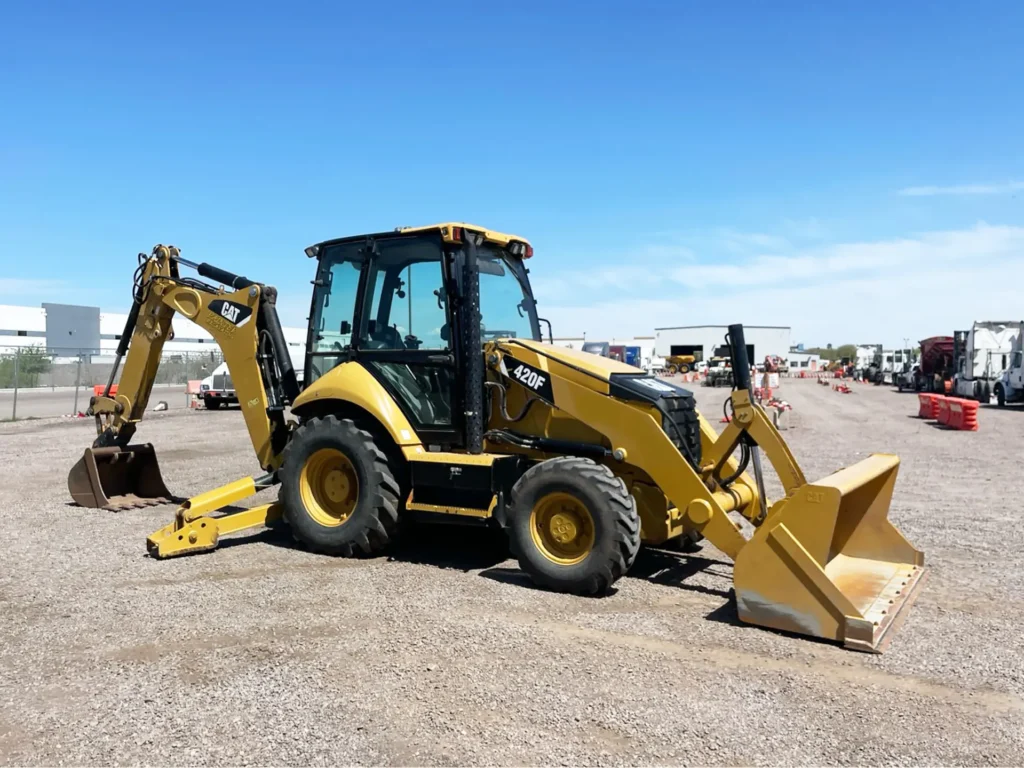
If your project is smaller or requires more versatility in a limited space, a backhoe is likely the better choice. Backhoes can handle a range of tasks and are great for smaller projects or residential work.
Backhoes are perfect for smaller tasks like trenching for utilities, digging in tight spaces or performing landscaping jobs. Their ability to operate in confined areas and switch between different tasks makes them incredibly versatile.
Consider using a backhoe for tasks like trenching, digging for plumbing or electrical work or landscaping. Their ability to move between different tasks, such as lifting, digging and loading, makes them ideal for smaller projects where budget and space are a concern.
Backhoes are often used in residential settings, where their versatility and compact size make them suitable for tight workspaces. They are also the go-to machines for utility companies and landscapers, who use them for digging trenches, planting trees or clearing small debris. Their design allows them to easily switch between functions, allowing operators to perform multiple tasks with a single piece of equipment.
However, backhoes are efficient in confined spaces, they lack the power and reach of excavators, so they’re not suitable for large, deep excavation projects.
Cost Considerations: Excavator vs Backhoe

When it comes to cost, there’s a clear distinction between excavator and backhoe. While excavators tend to have higher upfront costs and operational expenses, backhoes are typically more affordable to purchase and maintain.
Excavators come with a hefty price tag, both in terms of initial cost and operational expenses. Backhoes, however, are more cost-effective for smaller tasks and offer a lower total cost of ownership.
The cost of purchasing an excavator is typically higher than that of a backhoe, due to its larger size, power and specialized capabilities. However, the long-term benefits of excavators often outweigh their higher initial investment if you’re working on large-scale construction or mining projects. They provide greater efficiency and productivity, which can translate into a higher return on investment over time.
For smaller businesses or residential projects, however, the cost of an excavator might not be justifiable. In these cases, a backhoe offers the advantage of a lower initial cost, better fuel efficiency and lower maintenance costs. With their ability to perform multiple tasks, backhoes provide a good balance between affordability and performance, making them ideal for businesses that don’t need heavy-duty machines.
Ultimately, the choice between excavator and backhoe will depend on your budget and the types of projects you typically handle. If you’re dealing with large-scale, heavy-duty work, an excavator might make more financial sense. But for smaller, versatile tasks, a backhoe is often a more cost-effective option.
Excavator VS Backhoe-Which one is better for your business?
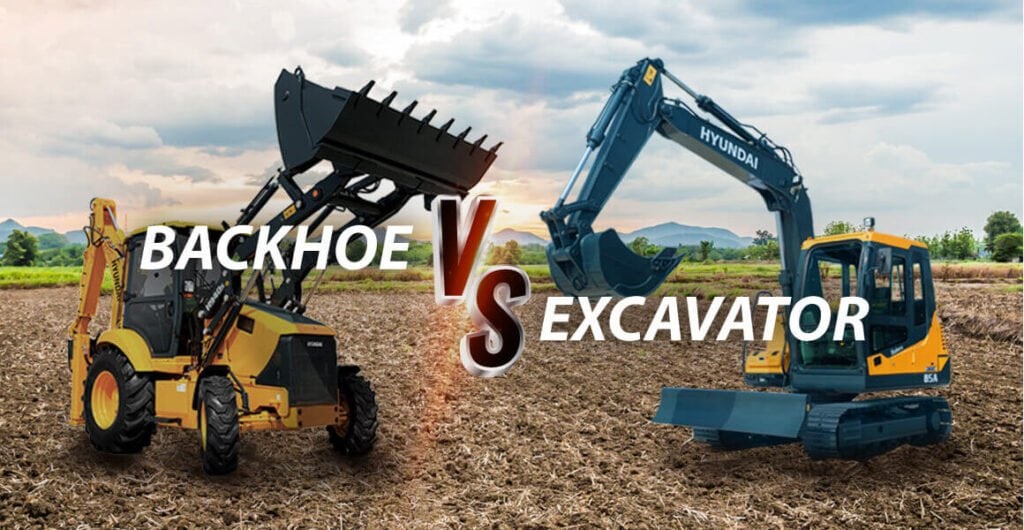
The best choice for your business depends on the types of projects you typically handle. For large-scale construction or heavy excavation work, an excavator is likely the better choice. For more versatile, smaller tasks, a backhoe could be the most efficient and affordable option.
If your business focuses on heavy-duty construction or mining projects, an excavator will provide the power and capacity you need. However, if you work in residential, landscaping or utility installation, a backhoe may be the more practical and cost-effective solution.
If your business focuses primarily on small residential projects, landscaping or utility installation, investing in a backhoe may be the right choice. It offers versatility and cost-effectiveness, allowing you to handle a range of tasks with a single machine.
However, if your business specializes in large-scale construction, roadwork or mining, an excavator will be more suitable due to its power, reach and efficiency in handling heavy-duty excavation tasks. Investing in an excavator for large projects may result in greater productivity and profitability over time.
Common Questions About Excavator and backhoe
Here are some common questions that can help you better understand the differences between excavator and backhoe and how they can serve your needs.

1. Is a mini excavator better than a backhoe?
When deciding between a mini excavator and backhoe, the best choice depends on your project’s needs. A mini excavator excels in tight spaces, offering greater maneuverability and precision for small excavation tasks. It’s ideal for landscaping, digging utility trenches or working in confined areas like urban settings.
In contrast, a backhoe offers more versatility with both a front loader and rear digging arm. This makes it suitable for a wider range of tasks such as digging, lifting and material handling. While it can perform in smaller areas, its larger size means it may be less efficient in very tight spaces. If your project involves multiple tasks and you need a one-machine solution, the backhoe is a better choice. However, for focused, precise digging in small spaces, a mini excavator would be more suitable.
2. How do I choose the right size of excavator and backhoe?
Choosing the right size for your excavator and backhoe depends on the project scope. For large-scale excavation or construction, you’ll need a larger excavator with extended reach and digging depth, such as the CAT 320D. This will help with heavy-duty tasks like trenching or moving large materials. For smaller, more precise jobs like landscaping or utility trenching, a backhoe like the JCB 3CX, with its compact size and multi-functional loader, is ideal. It balances mobility with enough power for medium-sized tasks.
The environment also plays a key role in choosing size—tight job sites or uneven terrain may require a more compact machine for better maneuverability. Consider your project’s digging depth, load capacity and reach requirements to determine the optimal size for your machine.
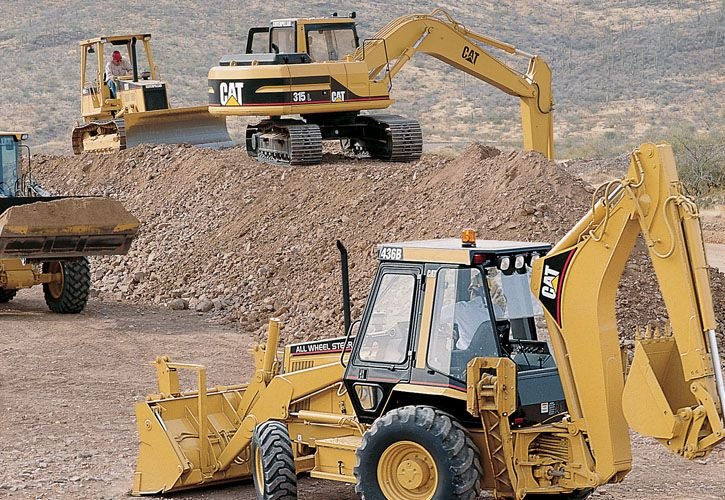
3. What are the maintenance requirements for excavator and backhoe?
Maintenance for both excavator and backhoe is crucial to prolong their lifespan and ensure optimal performance. For excavators, key maintenance tasks include checking hydraulic fluids, inspecting tracks or wheels and cleaning filters. The undercarriage, boom and bucket should also be regularly inspected for wear and tear, especially after heavy-duty tasks. Backhoes require similar attention, but are generally less demanding due to their smaller size and lighter workload.
Regular checks should be made on the hydraulic system, loader arms and bucket attachments. It’s important to clean the machine regularly, especially when working in dusty or muddy environments. Following the manufacturer’s recommended service schedule, changing fluids and performing routine inspections will help avoid costly breakdowns, reduce downtime and keep your equipment running efficiently.
4. Are excavators or backhoes more fuel-efficient?
When comparing the fuel efficiency of excavator and backhoe, backhoes tend to be more fuel-efficient for smaller, lighter tasks. Due to their compact size and multi-functional design, they consume less fuel while providing the flexibility needed for various operations like digging, lifting and loading. Excavators, on the other hand, are larger and designed for heavy-duty tasks, meaning they often require more fuel to perform intensive digging or earth-moving.
However, modern excavators are equipped with fuel-efficient technologies that optimize engine performance and reduce emissions. For large-scale construction projects, a backhoe may be the more cost-effective choice for fuel savings, while an excavator is better suited for high-output work despite slightly higher fuel consumption. Ultimately, the choice depends on the task and required workload.
5. How do I improve the lifespan of my excavator and backhoe?
To extend the lifespan of your excavator and backhoe, regular maintenance and proper operation are essential. For excavators, check the hydraulic system, lubricate moving parts and monitor the undercarriage for wear. Always change the oil on time, clean air filters and inspect the boom, arm and bucket. Backhoes require similar maintenance, with special attention to the loader arms, hydraulic fluids and attachments. Avoid overloading the equipment and ensure it’s not used beyond its rated capacity, as this can lead to accelerated wear. Proper storage, especially in extreme weather conditions, helps protect the machine’s components.
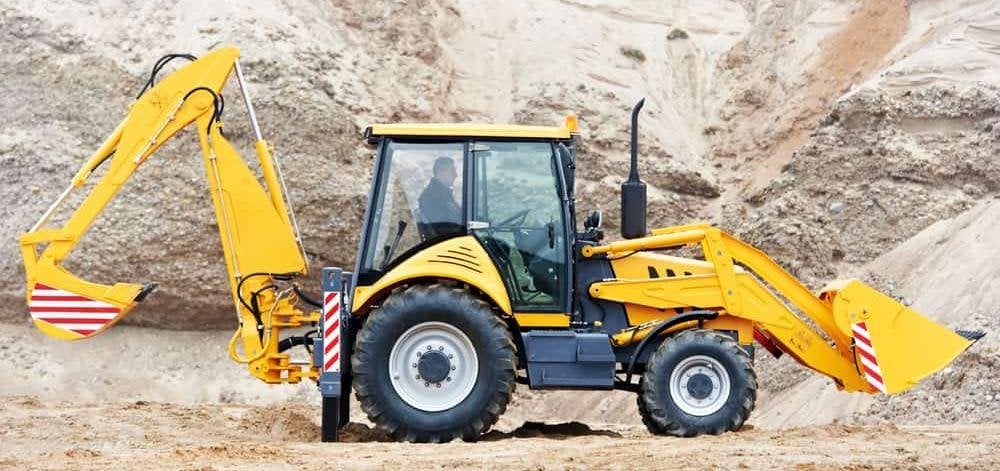
Additionally, operating the machines smoothly—avoiding harsh acceleration, sudden braking and sharp turns—will reduce unnecessary strain and increase the lifespan of both excavator and backhoe.
6. What are the common attachments for excavator and backhoe?
Both excavator and backhoe can be equipped with a variety of attachments to increase versatility. Excavators often use attachments such as digging buckets, hydraulic hammers, grapples and compaction plates. These attachments allow the excavator to handle tasks like trenching, material handling, demolition and breaking through hard surfaces. Backhoes are also highly adaptable, with common attachments including trenching buckets, augers and rippers.
These attachments make backhoes suitable for tasks like digging narrow trenches, breaking up hard soil or drilling holes for posts. The ability to switch out attachments allows both machines to take on different types of jobs with greater efficiency, providing a one-stop solution for many construction, landscaping and utility tasks. Depending on your project needs, choosing the right attachments can significantly boost productivity.
Understanding the key differences and features of excavator and backhoe can help you choose the right machine for your project. From selecting the right size and considering fuel efficiency to maintaining the equipment properly, these factors will determine the success of your operations. Whether you opt for a more compact excavator for precise tasks or a backhoe for multi-functional capabilities, making the right decision ensures long-term performance and productivity
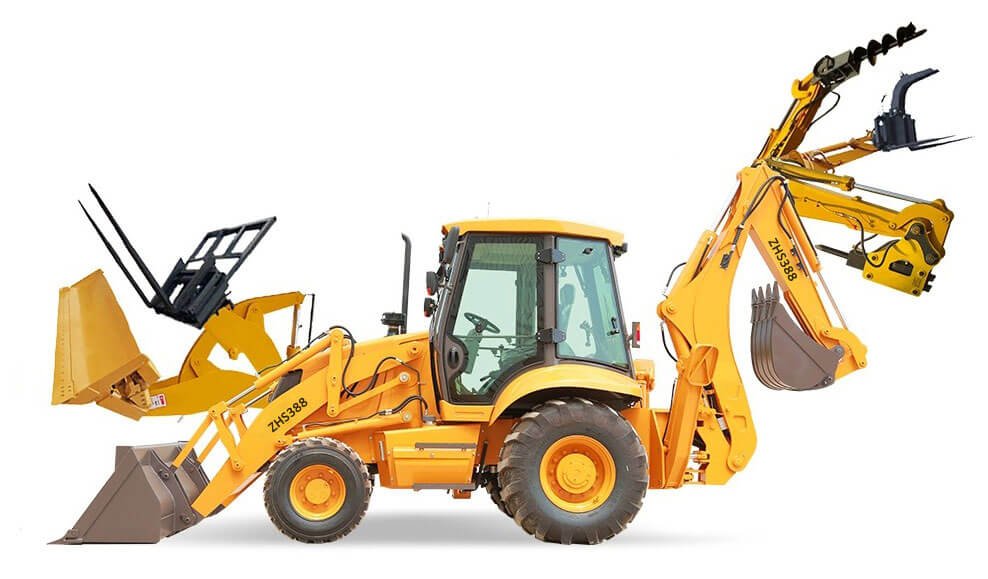
Recommended Models for excavator and backhoe
When it comes to choosing the right excavator and backhoe, the model selection is crucial. Different projects require different specifications and choosing a machine with the correct size, power and features can directly impact your productivity and cost-efficiency. Whether you are working on a massive construction site or a small residential project, knowing the recommended models can help you find the perfect match for your needs. Below are some of the top recommended models for both excavator and backhoe from trusted brands like CAT, Komatsu and Sany.
For excavators, consider models like the CAT 320D, Komatsu PC200-8 and Sany SY365C, which are known for their efficiency, durability and performance in large-scale tasks. For backhoes, the CAT 420F, Komatsu Jcb 3cx and Sany SY200 offer versatility, cost-effectiveness and excellent performance in smaller projects.
Recommended Models for Excavator and Backhoe
Excavators:
- CAT 320D
The CAT 320D is a versatile and fuel-efficient excavator designed for medium to large-scale construction projects. Its powerful engine and advanced hydraulic system ensure high digging force and deep reach, making it ideal for tough tasks like road construction, mining and trenching. The CAT Connect system provides real-time monitoring for improved productivity and reduced downtime. Its durability, fuel economy and operator comfort make it a reliable choice for long-term use. - Komatsu PC200-8
The Komatsu PC200-8 is a durable, fuel-efficient excavator ideal for construction and demolition work. With its powerful engine and precise hydraulics, it can perform various tasks, including digging, lifting and trenching. Its user-friendly design, robust undercarriage and easy maintenance contribute to low operational costs and maximum uptime, making it a great option for large projects that require high performance and reliability. - Sany SY365C
The Sany SY365C combines power, fuel efficiency and advanced hydraulic systems to handle demanding tasks like mining, roadworks and large excavation projects. Its high digging depth and performance capabilities ensure excellent productivity. The machine is known for its durability, low operating costs and reliable service, offering great value for money while reducing downtime and improving operational efficiency.
Backhoes:
- Sany SY200
The Sany SY200 is a compact backhoe ideal for smaller projects requiring maneuverability and power. Its high-performance hydraulics and fuel-efficient engine allow it to excel in tasks such as trenching, lifting and material handling. The machine’s compact size and excellent visibility make it perfect for tight spaces, while its versatile attachments make it adaptable to various construction tasks. It is an affordable yet durable option for businesses seeking a reliable backhoe for urban and residential projects. - CAT 420F
The CAT 420F is an efficient, versatile backhoe perfect for small to medium-sized tasks. With a powerful hydraulic system and fuel-efficient engine, it excels at trenching, material handling and road repairs. Its compact size makes it easy to maneuver in tight spaces and the operator’s cabin offers superior comfort for long shifts. It’s a great choice for utility work, landscaping and residential projects, providing high performance and low maintenance costs. - JCB 3CX
The JCB 3CX is a powerful and versatile backhoe well-suited for construction, landscaping and utility work. Known for its efficiency, it combines a robust engine with advanced hydraulic systems for excellent digging, lifting and loading performance. Its compact design allows for easy maneuverability in confined spaces, while the four-wheel drive ensures stability on uneven terrain. The 3CX offers great fuel efficiency and is designed to minimize downtime, making it a reliable choice for various projects.
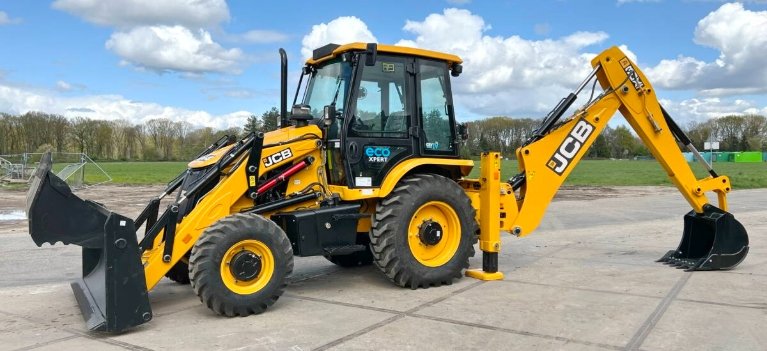
Choosing the right model for both excavator and backhoe is essential to ensure that your project runs smoothly and efficiently. Whether you are looking for the digging power and reach of an excavator like the CAT 320D or the versatile capabilities of a backhoe like the CAT 420F, the options listed above are all top performers in their categories. By understanding your specific needs—whether it’s large-scale excavation or small-space maneuvering—you can make a well-informed decision that will optimize your productivity and profitability.
Summary:
In conclusion, choosing between an excavator and backhoe comes down to the size and type of project you’re working on. Excavators are ideal for heavy-duty, large-scale projects, while backhoes offer versatility and cost-effectiveness for smaller, more flexible jobs. If you have any questions or problems with excavator and backhoe, please contact us for more information.

